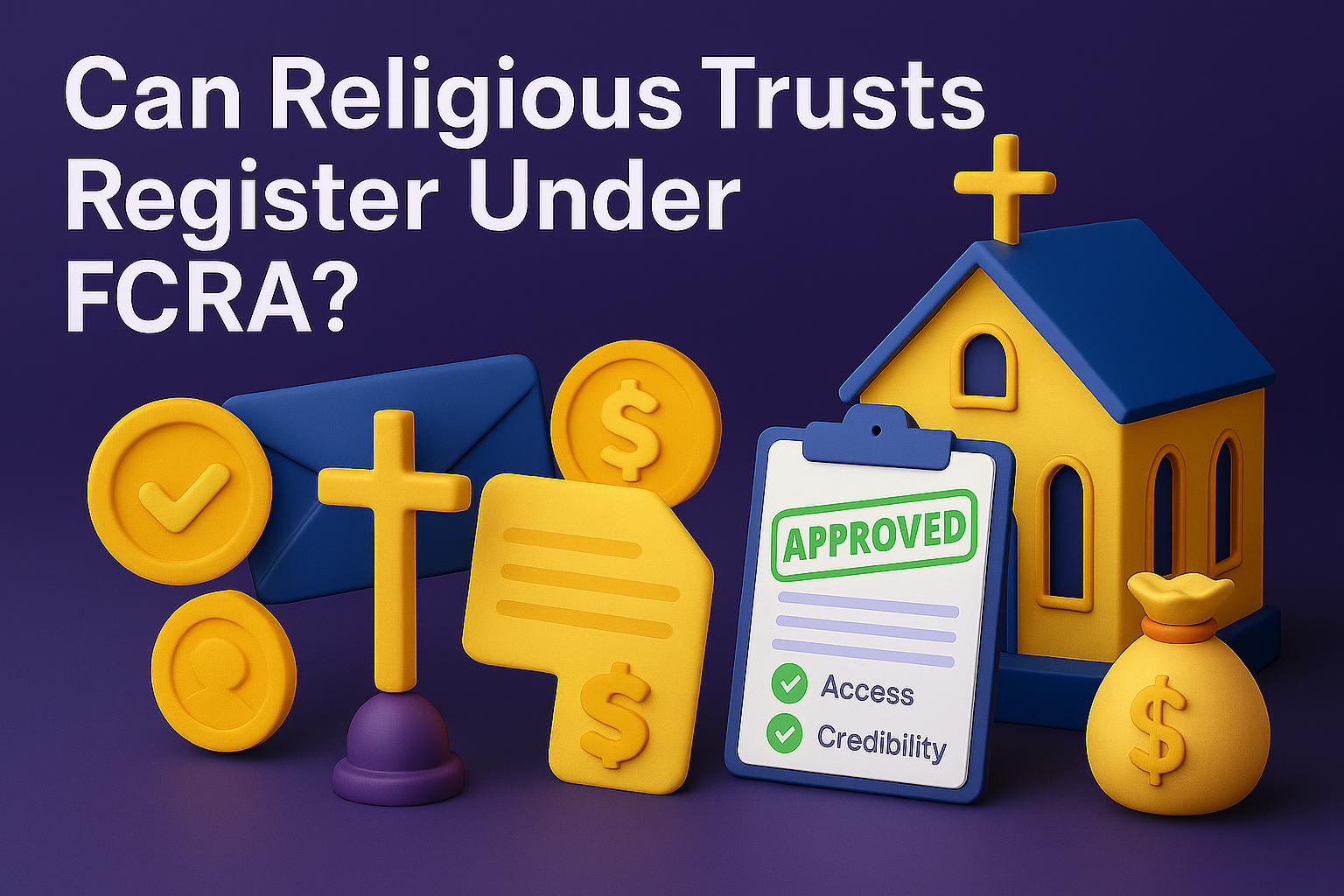
Can Religious Trusts Register Under FCRA?
Religious trusts, which focus on activities related to religious propagation, charity, or community welfare, often seek FCRA registration to access foreign contributions. However, their eligibility is a contentious issue due to the FCRA’s stringent provisions and concerns about misuse of funds for religious conversion or divisive activities.
Legal Provisions and Bare Act Analysis
Section 3(1)(b) of the FCRA prohibits certain entities, including those engaged in activities that propagate religious conversion, from receiving foreign contributions. However, religious trusts engaged in charitable activities, such as education, healthcare, or disaster relief, may apply for FCRA registration under Section 11, provided their activities align with secular and charitable objectives.
Section 12(4) empowers the Central Government to assess an applicant’s objectives, activities, and past conduct before granting registration. The FCRR, Rule 5, requires applicants to submit detailed information about their activities, ensuring they do not promote communal disharmony or conversion.
Judicial Interpretations and Case Law
The judiciary has played a critical role in interpreting the eligibility of religious trusts. In Church of North India v. Union of India (2017), the Delhi High Court up held the cancellation of an FCRA registration for a religious trust that used foreign funds to promote conversion activities, violating Section 3(1)(b). The court clarified that religious trusts could register under FCRA if their activities were strictly charitable and secular, such as running schools or hospitals.
In Sri Ramakrishna Mission v. Union of India (2019), the Supreme Court allowed a religious trust to retain its FCRA registration after demonstrating that its foreign contributions were used exclusively for educational and healthcare programs, not religious propagation. This case established a precedent that religious trusts with secular charitable activities are eligible, provided they maintain transparency.
Practical Implications and Examples
A religious trust running a hospital, such as the “Sri Sai Charitable Trust,” can apply for FCRA registration to receive foreign funds for medical equipment or free treatment programs. The trust must ensure that its activities are secular and do not involve proselytization. For instance, if the trust organizes free medical camps open to all communities, it strengthens its case for FCRA eligibility.
Conversely, a trust explicitly engaged in religious conversion, such as funding missionary activities aimed at proselytizing, would be barred. In 2021, a Tamil Nadu-based trust faced cancellation of its FCRA registration after evidence surfaced of funds being used for religious sermons targeting vulnerable communities.
Advantages of Compliance
For religious trusts, FCRA registration offers:
Access to Global Funding: Enables trusts to receive donations from international philanthropists or organizations.
Enhanced Credibility: Registration signals adherence to legal standards,boosting donor confidence.
Community Impact: Facilitates large-scale charitable projects,such as schools or hospitals, benefiting diverse communities.
Professional Advice
Religious trusts seeking FCRA registration should:
Additional Points: Challenges and Recent Trends
The FCRA Amendment Act, 2020, increased scrutiny of religious trusts, with the MHA closely monitoring their activities to prevent misuse of funds. A key challenge is the perception that religious trusts may engage in covert conversion activities, leading to stricter audits. Trusts must proactively demonstrate their secular credentials through annual reports and public disclosures. Recent trends show a rise in cancellations of FCRA registrations for religious trusts, with over 1,800 cancellations reported in 2022 for non-compliance
The rules and regulations that govern the functioning and operations of an Association of Persons ...
How to Treat Donations in Kind– Whether They Are Taxable or Exempt Overview ...
FCRA Compounding vs. Prosecution Handling Past Violations Overview The FCRA, 2010, pr...
Foreign Hospitality vs Foreign Contribution Clarifying Confusion Overview The distinc...
Charitable Organisations – Taxation & Compliance (Legal Research Guide) Th...
A Complete Guide to Legal Structure, Registration, and Taxation of NPOs in India Introduction ...
Foreign Travel for NGO Work: Does It Require FCRA Approval? The FCRA governs the acce...
Difference Between Trust, Society, and Section 8 Company Selecting the right NGO structure (Trus...
What Happens When Trustees Resign or Die–Legal and Practical Issues The resignati...
Understanding Charitable Trusts in India In India, the most commonly understood form of constitut...